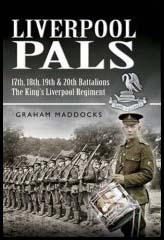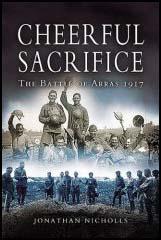Spartacus Review
Volume 14: 10th March, 2008
First World War

Title: Liverpool Pals
Author: Graham Maddocks
Editor:
Publisher: Pen & Sword
Price: £25.00
Bookshop: Amazon
Spartacus Website:
Category:
"Liverpool Pals", is a record of duty, courage and endeavour of a group of men who, before war broke out in 1914, were the backbone of Liverpool's commerce. Fired with patriotism, over 4,000 of these businessmen volunteered in 1914 and were formed into the 17th, 18th, 19th and 20th (Service) Battalions of the King's (Liverpool Regiment); they were the first of all the Pals battalions to be raised, and they were the last to be stood down.It is commonly held that the North of England's Pals battalions were wiped out on the 1st July, 1916, certainly this befell a number of units, but the Liverpool Pals took all their objectives on that day. From then on they fought all through the Somme Battle, The Battle of Arras and the muddy hell of Passchendaele in 1917, and the desperate defence against the German offensive of March 1918.

Title: Cheerful Sacrifice
Author: Joanthan Nicholls
Editor:
Publisher: Pen & Sword
Price: £14.99
Bookshop: Amazon
Spartacus Website:
Category:
Cheerful Sacrifice tells the story of the spring offensive of April - May 1917, otherwise known as the Battle of Arras. Probably because the noise had hardly died down before it started up again with the explosions at Messines, shortly to be followed by the even more horrible Third Ypres - remembered as Passchendaele - the Battle of Arras has not received the attention it deserves. Yet, as the author points out, on the basis of the daily casualty rate it was the most lethal and costly British offensive battle of the First World War. In the thirty-nine days that the battle lasted the average casualty rate was far higher than at either the Somme or Passchendaele. Jonathan Nicholls, in this his first book, gives the Battle of Arras its proper place in the annals of military history, enhancing his text with a wealth of eye-witness accounts. One is left in no doubt that the survivor who described it as 'the most savage infantry battle of the war', did not exaggerate. Nor can there be much doubt that the author is destined to rise high in the firmament of military historians.
